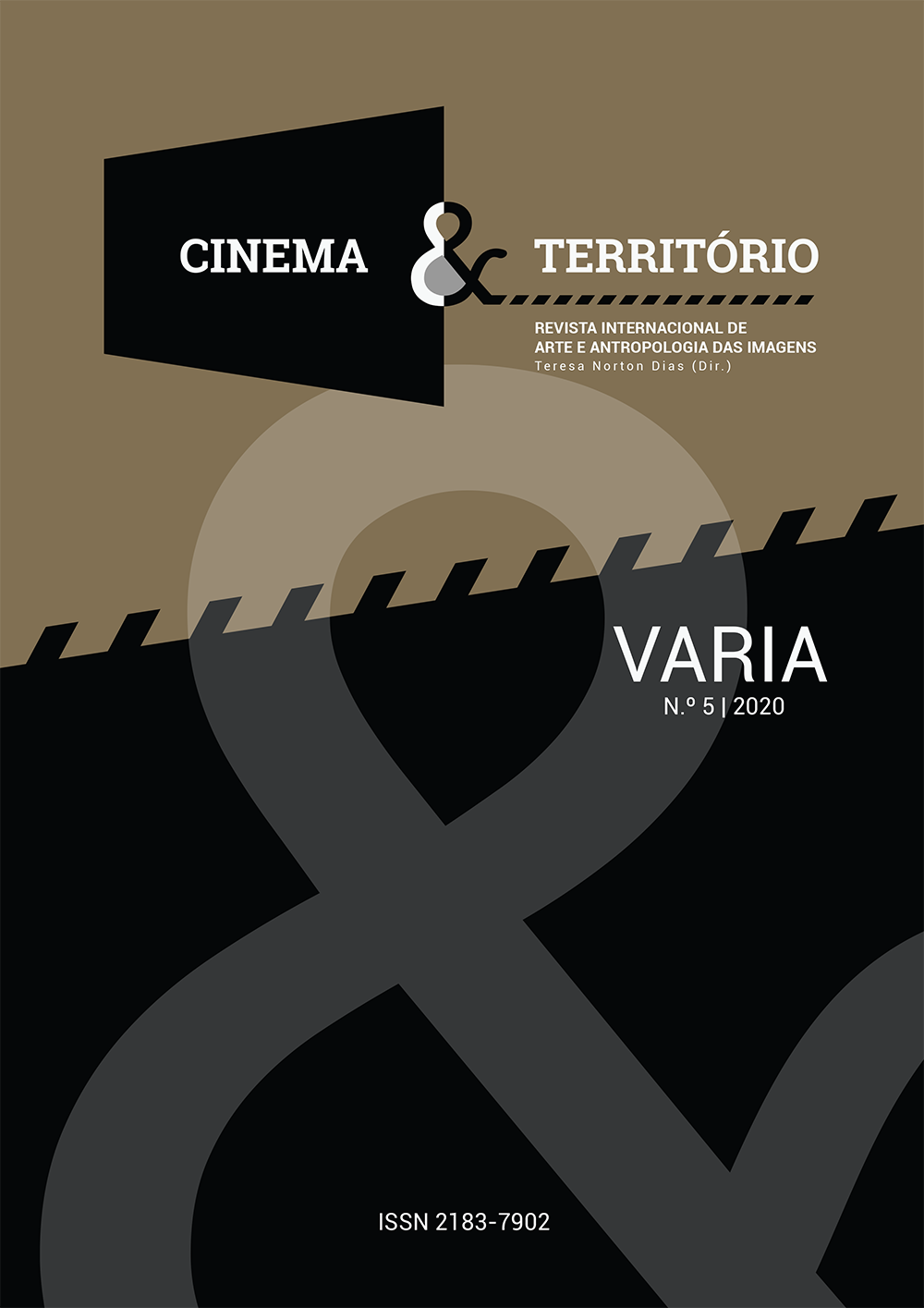"Festival de Cans": Rethinking the Film Festival through Parody in Rural Galicia
DOI:
https://doi.org/10.34640/52020CTRVNFESKeywords:
Festival de Cans, film festivals, ethnography, parody, rural space, popular, cultureAbstract
This article focuses on the Festival de Cans, a picturesque film event that takes place in Cans, a rural hamlet in the heart of the West Galician province of Pontevedra. Through an ethnographic approach, this research seeks to understand how Cans’ peculiar rituals and the organization’s rhetoric uses parody as an aesthetic vehicle that allows us to reinterpret dominant meanings, allowing the conversion of the Galician rural landscape, its community, and settings into a location of cultural importance. Thus, it is interesting to observe how the festival articulates an exceptional setting where barns, workshops, basements, cellars and stables serve temporarily as film venues, altering the high-ranked film festivals cinephilic standards, excess and etiquette. Via the hybridization of classic film festival traditions with rural celebratory traditions Cans has consolidated its position both in the Spanish film festival circuit and the Galician film industry, becoming a must-attend event among Galician media professionals and personalities.
References
Amago, S. (2018). Lois Patiño, Xurxo Chirro, and the New Galician Documentary. Abriu: Estudos de Textualidade Do Brasil, Galicia e Portugal, 7, 81-99.
Álvarez, L. A. (2011). La Economía De Galicia, una Panorámica, C. 1750-2010. Historia Contemporánea, 42, 51.
Bourdieu, P. (1983). The field of cultural production, or: The economic world reversed. Poetics, 12 (4-5), 311-356.
Buser, M., Bonura, C., Fannin, M., & Boyer, K. (2013). Cultural activism and the politics of place-making. City, 17(5), 606-627.
Chan, F. (2011). The international film festival and the making of a national cinema. Screen, 52(2), 253-260.
Colmeiro, J. (2009). Smells Like Wild Spirit: Galician “Rock Bravú”, Between The “Rurban” and the “Glocal.” Journal of Spanish Cultural Studies, 10(2), 225-240.
Colmeiro, J. (2018). Peripheral Visions / Global Sounds: From Galicia to the World. Liverpool: Liverpool University Press.
Con Alfonso Pato, Director del the Festival de Cans. (2018, May 24). In Vigo Hoy por Hoy. Retrieved May 28, 2020, from https://www.youtube.com/watch?v=UrtRMjH6yHA
Creus, J., Carro Patiño, I., & Álvarez Blanco, A. (2015). Cartography of a festive state. The agreement of Cans. Bulletin of People-Environment Studies, 42, 29–36.
Dayan, D. (2000). Looking for Sundance: The Social Construction of a Film Festival. In I. Bondebjerg (Ed.), Moving Images, Culture and the Mind (pp. 43–52). Luton: University of Luton Press.
De Valck, M. (2005). Drowning in Popcorn in the International Film Festival Rotterdam? In M. Hagener & M. De Valck (Eds.), Cinephilia: Movies Love and Memory (pp. 97–109). Amsterdam: Amsterdam University Press.
De Valck, M. (2007). Film Festivals: From European Geopolitics to Global Cinephilia. Amsterdam: Amsterdam University Press.
Decálogo para la visibilidad de las mujeres. (s.d.). the Festival de Cans. Retrieved July 6, 2020, from http://www.festivaldecans.gal/es/visibilidade-das-mulleres/
Dentith, S., & Dentith, D. S. (2000). Parody. London: Taylor & Francis US.
Dickson, L.A. (2015). “Ah! Other Bodies!”: Embodied spaces, pleasures and practices at Glasgow Film Festival. Participations. Journal of Audience and Reception Studies, 12(1), 703–724.
Docampo, I. (2018). Quince Primaveras. Making of do XV the Festival de Cans. Retrieved July 4, 2020, from https://www.youtube.com/watch?v=0fb9rnYYiB8
Duncombe, S. (2007). Cultural resistance. The Blackwell Encyclopedia of Sociology.
Elsaesser, T. (2005). Film Festival Networks: The New Topographies of Cinema in Europe. In European Cinema: Face to Face With Hollywood (pp. 82-107). Amsterdam: Amsterdam University Press.
Fernández, M. (2019, May). Festivais coma o de Cans son o último reducto para as curtametraxes. CanZine. Xornal Oficial Do Festival de Curtametraxes de Cans, 12.
Fraser, N. (1990). Rethinking the Public Sphere: A Contribution to the Critique of Actually Existing Democracy. Social Text, (25/26), 56-80.
Gaunt, S. (2008). Troubadours and irony (Vol. 3). Cambridge: Cambridge University Press.
Geertz, C. (1973). The Interpretation of Cultures. New York: Basic Books.
Hernán, A. (2019, May). Estamos algo nerviosos porque subir ao escenario do torreiro impón moito... CanZine. Xornal Oficial do Festival de Curtametraxes de Cans, 10.
Hjort, M., & Petrie, D. J. (Eds.). (2007). The cinema of small nations. Bloomington: Indiana University Press.
Hutcheon, L. (2000). A theory of parody: The teachings of twentieth-century art forms. New York: University of Illinois Press.
Iordanova, D. (2009). The Film Festival Circuit. In D. Iordanova & R. Rhyne (Eds.), Film Festival Yearbook 1: The Festival Circuit (pp. 23-39). St Andrews: St Andrews Film Studies.
Killick, A. (2017). Film festivals and counter-hegemony: Radical screening practices in the neoliberal city.
Koven, M. J. (1999). You Don’t Have to be Filmish’: The Toronto Jewish Film Festival. Ethnologies, 21(1), 115-132.
Lee, T. (2016). Being there, taking place: Ethnography at the film festival (M. De Valck, S. Loist, & B. Kredell, Eds.). New York: Routledge.
Meixide, C. (2016). Cans. Santiago de Compostela: Sacauntos.
Mercader, E. (2019, May). Rodrigo Sorogoyen será o protagonista dos Coloquios na leira. CanZine. Xornal Oficial do Festival de Curtametraxes de Cans, 15.
Murado, M. A. (2008). Otra idea de Galicia. Madrid: Debate Editorial.
Nuñez Alonso, F. J. (2017). Avaliación de eventos culturais: O caso do the Festival de Cans en Galicia (Universidade de Santiago de Compostela). Retrieved from https://minerva.usc.es/xmlui/handle/10347/15457
Peirano, M. P. (2020). Mapping histories and archiving ephemeral landscapes: Strategies and challenges for researching small film festivals. Studies in European Cinema, 17(2), 170-184.
Pérez Pereiro, M. (2014). Paisaxe na néboa. Unha cartografía do cinema galego recente. Galicia 21. Journal of Contemporary Galician Studies, 6(F), 77-91.
Ruy, K., Pereiro, M. P., & Baamonde, S. R. (2016). O sucesso dos cinemas menores: Baixo orçamento e alternativas cinematográficas no Brasil e na Galiza. Eptic online: revista electronica internacional de economia política da informaçao, da comuniçao e da cultura, 18(2), 125-141.
Shepherd, D., & Hutcheon, L. (1986). A Theory of Parody. The Teachings of Twentieth-Century Art Forms. Poetics Today, 7(4), 790.
Souto, Xurxo. (2017). the Festival de Cans 2017. In GZMUSICATV. Retrieved June 15, 2020, from https://www.youtube.com/watch?v=nu2sQHZvKHw
Stringer, J. (2008). Genre Films and Festival Communities: Lessons from Nottingham, 1991-2000. Film International, 6(4), 53-59.
Tolentino, J. (2019, May). A Cans, quéreselle. A Cannes, débeselle. CanZine. Xornal Oficial Do Festival de Curtametraxes de Cans, 20.
Vallejo, A. (2014). Festivales cinematográficos. En el punto de mira de la historiografía fílmica. Secuencias. Revista de Historia Del Cine, (39), 13-42.
Vallejo, A. (2017). Ethnographies of Film Festivals. Reflections on Methodology. In A. Vallejo & M. Paz Peirano (Eds.), Film Festivals and Anthropology (pp. 251-260). Cambridge Scholars Publishing.
Vivar, R. (2018). Never Seen a Shot Like That Before! Playfulness and Participatory Audiences in San Sebastian Horror and Fantasy Film Festival. In S. Atkinson & H. Kennedy (Eds.), Live Cinema: Cultures, Economies, Aesthetics (pp. 117-132). London and New York: Bloomsbury Academic.
Wong, C. H.-Y. (2011). Film Festivals: Culture, People, and Power on the Global Screen. New Brunswick, New Jersey and London: Rutgers University Press.
Zielinski, G. (2012). On the Production of Heterotopia, and Other Spaces, in and around Lesbian and Gay Film Festivals. Jump Cut: A Review of Contemporary Media, (54). Retrieved from http://www.ejumpcut.org/archive/jc54.2012/gerZelinskiFestivals/ [06.06.2020]
Downloads
Published
How to Cite
Issue
Section
License
Copyright (c) 2020 Rosana Vivar Navas, Luís Román Suárez-Canedo

This work is licensed under a Creative Commons Attribution-NonCommercial 4.0 International License.
For more information follow the link: CC Atribuição-NãoComercial 4.0








